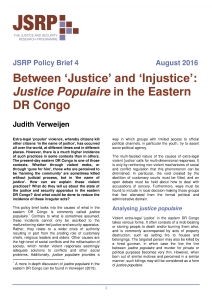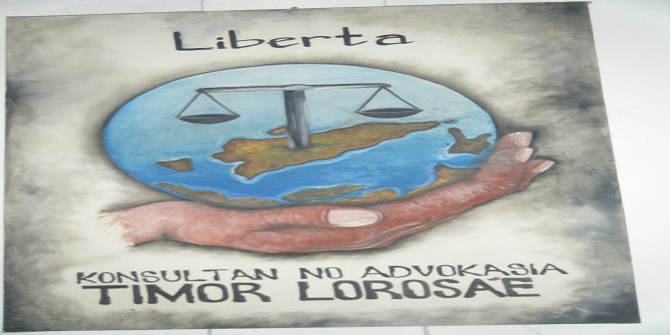JSRP Policy Brief 4, Between ‘Justice’ and ‘Injustice’: Justice Populaire in the Eastern DR Congo, by Judith Verweijen, is out now, exploring the phenomenon of justice populaire.
 Extra-legal ‘popular’ violence, whereby citizens kill other citizens ‘in the name of justice’, has occurred all over the world, at different times and in different places. However, there is a much higher incidence of such practices in some contexts than in others. The present-day eastern DR Congo is one of those contexts. Whether through violent mobs, or through ‘guns for hire’, those who are perceived to be ‘harming the community’ are sometimes killed without judicial process, but in ‘the name of justice’. How can we explain these violent practices? What do they tell us about the state of the justice and security apparatus in the eastern DR Congo? And what could be done to reduce the incidence of these irregular acts?
Extra-legal ‘popular’ violence, whereby citizens kill other citizens ‘in the name of justice’, has occurred all over the world, at different times and in different places. However, there is a much higher incidence of such practices in some contexts than in others. The present-day eastern DR Congo is one of those contexts. Whether through violent mobs, or through ‘guns for hire’, those who are perceived to be ‘harming the community’ are sometimes killed without judicial process, but in ‘the name of justice’. How can we explain these violent practices? What do they tell us about the state of the justice and security apparatus in the eastern DR Congo? And what could be done to reduce the incidence of these irregular acts?
This policy brief looks into the causes of what in the eastern DR Congo is commonly called justice populaire. Contrary to what is sometimes assumed, these incidents cannot only be ascribed to the malfunctioning state-led justice and security apparatus. Rather, they relate to a wider crisis of authority resulting in part from the eroding role of customary chiefs, religious leaders and elders. Other causes are the high level of social conflicts and the militarisation of society, which render violent responses seemingly adequate solutions to conflicts and other social problems, Additionally, justice populaire provides a way in which groups with limited access to official political channels, in particular the youth, try to assert socio-political agency.
The multi-faceted nature of the causes of extra-legal violent ‘justice’ calls for multi-dimensional responses. It is only by reinforcing non-violent mechanisms of social and conflict regulation that this phenomenon can be diminished. In particular, the void created by the abolition of customary courts must be filled, and an open debate must be held about how to deal with accusations of sorcery. Furthermore, ways must be found to include in local decision-making those groups that feel alienated from the formal political and administrative domain.
Read the full Policy Brief here.





